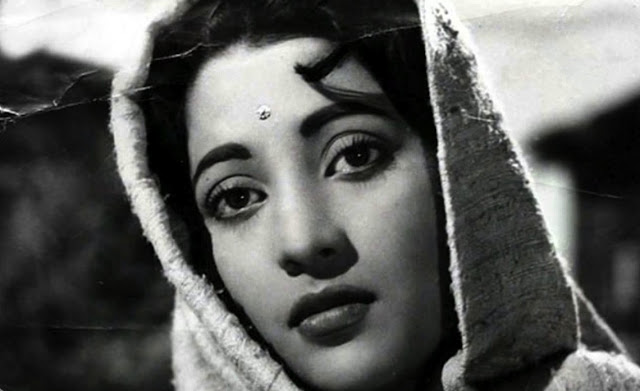Suchitra Sen|About Suchitra Sen| Career Of Suchitra Sen|Suchitra Sen's Personal life| Education Of Suchitra Sen|ReelWork
Suchitra Sen
Suchitra Sen (born as Roma Dasgupta) (6 April
1931 – 17 January 2014) was an Indian film actress who worked
in Bengali and Hindi cinema. The movies in which she was paired
opposite Uttam Kumar became classics in the history of Bengali
cinema.
Sen was the second Indian actress to receive an award at an
international film festival when at the 1963 Moscow International Film
Festival, she won the Silver Prize for Best Actress for Saat Pake
Bandha. In 1972, she was awarded the Padma Shri, the fourth
highest civilian award in India. From 1979 on, she retreated from public
life and shunned all forms of public contact; for this, she is often compared
to Greta Garbo. In 2005, she refused the Dadasaheb Phalke Award,
the highest cinematic award in India, to stay out of the public eye. In
2012, she was conferred the West Bengal Government's highest honor: Banga
Bibhushan. Her first official release was Sukumar Dasgupta's Saat
Number Kayedi (1953). She was catapulted to stardom after she was
cast as Vishnupriya by Devaki Kumar Bose in his Bhagaban Shree Krishna
Chaitanya (1953).
Personal
life and education
Rama Dasgupta aka Suchitra Sen was born on 6 April 1931, in
a Bangali family of Bhanga Bari village of Belkuchi Upozila, now in Sirajgonj
District, Greater Pabna. Her father, the late Korunamoy Dasgupta was a
sanitation officer in Pabna Municipality. Her mother, the late Indira Devi
was a homemaker. She was their fifth child and second daughter. Sen is a
granddaughter of the poet Rajonikant Sen. She received her formal
education in Pabna Government Girls High School. The violence of Partition
in 1947, brought her family to West Bengal, which was comparably a safe zone
for Bengalis. where she married Dibanath Sen, son of a wealthy industrialist
Adinath Sen, in 1947, at the age of 15 years. and had one daughter, Moon
Moon Sen, who is a former actress. Her father-in-law, Adinath Sen, was
supportive of her acting career in films after her marriage. Her
industrialist husband invested greatly in her career and supported her.
Sen had made a successful entry into Bengali films in 1952, and then a
less successful transition into the Hindi movie industry. According to
persistent but unconfirmed reports in the Bengali press, her marriage was
strained by her success in the film industry.
Career
Suchitra Sen made her debut in films with Shesh Kothaay in
1952, but it was never released. The following year saw her act
opposite Uttam Kumar in Sharey Chuattor, a film by Nirmal
Dey. It was a box-office hit and is remembered for launching Uttam-Suchitra as
a leading pair. They went on to become the icons for Bengali dramas for more
than 20 years, becoming almost a genre unto themselves. She has acted in
30 of her 60 films with Uttam Kumar. She received a Best Actress Award
nomination for the film Devdas (1955), which was her
first Hindi movie. Her Bengali melodramas and romances, especially
with Uttam Kumar, made her the most famous Bengali actress ever.
Her films ran through the 1960s and '70s. Her husband died in 1970 in
Baltimore, Maryland, USA. Suchitra went on to act in films such as in the Hindi
film Aandhi (1974). Aandhi was inspired by
India's Prime Minister Indira Gandhi. Sen received a Filmfare Award nomination
as Best Actress, while Sanjeev Kumar, who played the role of her husband,
won the Filmfare as Best Actor.
One of her best-known performances was in Deep Jwele Jaai (1959).
She played a character named Radha Mitra, a hospital nurse employed by a
progressive psychiatrist, Pahadi Sanyal, who is expected to develop a personal
relationship with male patients as part of their therapy. Sanyal diagnoses the
hero, Basanta Choudhury, as having an unresolved Oedipal dilemma. He
orders Radha to play the role though she is hesitant as in a similar case she
had fallen in love with the patient. She finally agrees and bears up to
Choudhury's violence impersonates his mother, sings his poetic compositions, and in the process falls in love again. In the end, even as she brings about
his cure, she suffers a nervous breakdown. The film is noted for its partly lit
close-ups of Sen, which set the tone of the film. Asit Sen remade the
film in Hindi as Khamoshi (1969), with Waheeda Rehman in
the Suchitra Sen role.
Suchitra Sen's other landmark film with Asit Sen was Uttar
Falguni (1963). She plays the dual role of a courtesan, Pannabai, and
her daughter Suparna, a lawyer. Critics note that she brought a great deal of
poise, grace, and dignity to the role of a fallen woman determined to see her
daughter grow up in a good, clean environment.
Suchitra Sen's international success came in 1963 when she won the best
actress award at the Moscow International Film Festival for the
movie Saat Pake Bandha, becoming the first Indian actress to
receive an international film award.
A film critic summed up Suchitra Sen's career and continuing legacy
as "one half of one of Indian cinema's most popular and abiding screen
pairs, Suchitra Sen redefined stardom in a way that few actors have done,
combining understated sensuality, feminine charm, and emotive force and a
no-nonsense gravitas to carve out a persona that has never
been matched, let alone surpassed in Indian cinema"
In
retirement
Suchitra Sen refused Satyajit Ray's offer due to a scheduling
problem. As a result, Ray never made the film Devi Chaudhurani,
based on the novel written by Rishi Bankim Chandra Chattopadhyay. She also
refused Raj Kapoor's offer for a film under the RK banner.
Sen continued to act after her husband's death in 1970 but called it the day when Pronoy Pasha flopped and retired from the
screen in 1978 after a career of over 25 years to a life of quiet seclusion.
She was to do a film project; Nati Binodini, also starring Rajesh
Khanna, but the film was shelved mid-way after shooting when she decided
to quit acting.
She assiduously avoided the public gaze after her retirement and devoted
her time to the Ramakrishna Mission.
Death
Suchitra Sen was admitted to the hospital on 24 December 2013 and was
diagnosed with a lung infection. She was reported to have been recovering well
in the first week of January. She died at 8.25 am on 17 January 2014, due
to a heart attack. She was 82 years old.
Suchitra Sen's death was condoled by many leaders, including the
President of India Pranab Mukherjee, the Prime Minister Dr. Manmohan
Singh, the Prime Minister of Bangladesh, Sheikh Hasina, and BJP's
Prime Ministerial candidate Narendra Modi. A gun salute was given
before her cremation, upon the orders of Mamata Banerjee, the Chief
Minister of West Bengal.
Respecting her fierce desire for complete privacy, her last rites were
performed at Kolkata's Kaioratola crematorium, barely five and half hours after
she died, with her coffin reaching the crematorium in a flower-decked hearse
with dark-tinted windows. Despite being Bengal's greatest star, referred to as
"Mahanayika", she had consciously chosen to step into oblivion and
she remained an enigma till her last, although thousands of fans had converged
at the crematorium to catch one last glimpse of their idol. Her entire medical
treatment had also been done in seclusion and secrecy.










0 Comments